A great resource to help you track those mood swings!
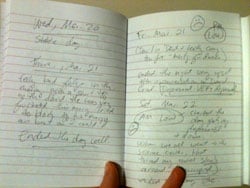 A couple months ago I realized I was experiencing some pretty severe ups and downs emotionally, and was beginning to wonder if I was Bipolar. Bipolar Disorder runs in my family. I've battled depression throughout my life, but in recent months highs and lows have become very obvious to me - especially debilitating lows. As anyone does when they think they have an illness, I of course Googled information online like a typical hypochondriac, viewed YouTube testimonials, and stumbled upon a download called a "Mood & Goal Tracking Diary."
A couple months ago I realized I was experiencing some pretty severe ups and downs emotionally, and was beginning to wonder if I was Bipolar. Bipolar Disorder runs in my family. I've battled depression throughout my life, but in recent months highs and lows have become very obvious to me - especially debilitating lows. As anyone does when they think they have an illness, I of course Googled information online like a typical hypochondriac, viewed YouTube testimonials, and stumbled upon a download called a "Mood & Goal Tracking Diary."
This PDF download seemed like a great idea to me. I wanted to pursue diagnosis to find out officially if I was Bipolar, but I knew it would be helpful if I started tracking my mood swings daily using something like this.
After printing out the free PDF, I appreciated the thorough charts, but it all seemed so clinical and dry to a right-brainer like me. I decided it would be more fun to actually keep a daily journal so I could not only note my up and down days, but also the transitions within the day, writing down what triggered my moods specifically, as well as having a safe place to purge my pissed-off rantings.
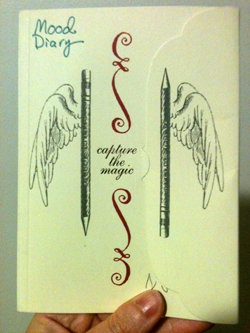 I didn't want to use one of my hardback blank books I normally use for my journaling, so I grabbed one of the cheap paper journals I bought from a craft store sale bin months ago. I simply labeled it on the front, "Mood Diary."
I didn't want to use one of my hardback blank books I normally use for my journaling, so I grabbed one of the cheap paper journals I bought from a craft store sale bin months ago. I simply labeled it on the front, "Mood Diary."
I typically waited to enter my daily reports and rantings at the end of the day, unless I just couldn't wait. Some days I would write simply "Stable day" if I couldn't remember any highs or lows at all. Some days there would be a couple entries per day, noting when moods would hit hard to accurately track those swings and record the triggers, capturing the raw emotion of the moments.
I also used the diary as a notebook to scribble down AHAH moments from therapy sessions. When words failed me, I'd doodle. I did whatever it took to at least record my thoughts and ideas. Sometimes I'd even wake up in the middle of the night with thoughts that wouldn't rest until I'd write them down in the Mood Diary. If it was something that didn't fit as a daily entry, I'd just flip to the empty rear pages of the book and scribble my thoughts down in there, just to get it all out of my head.
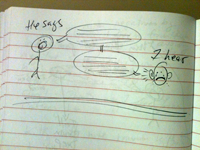 Keeping a Mood Diary really helped me pay closer attention to not only my mood swings, but also what was triggering those swings. After only a few weeks of therapy, my therapist was able to definitively tell me I wasn't Bipolar, but that I was certainly unhappy, and I realized from my Mood Diary that my mood swings heavily depended on reactions to marital stress.
Keeping a Mood Diary really helped me pay closer attention to not only my mood swings, but also what was triggering those swings. After only a few weeks of therapy, my therapist was able to definitively tell me I wasn't Bipolar, but that I was certainly unhappy, and I realized from my Mood Diary that my mood swings heavily depended on reactions to marital stress.
So thanks to my Mood Diary, I've been able to pinpoint very quickly with my therapist (within a month) the specific areas of my life that need to be addressed. I know my own journey of recovery is just beginning, but I'm taking my therapy very seriously and working very hard on improving my marriage life, bringing love back into the picture (which can be difficult when you've been married for 10+ years).
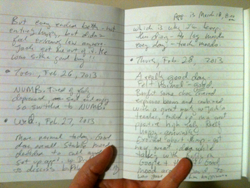 If you're interested in keeping a Mood Diary to track your own mood swings, here are my suggestions:
If you're interested in keeping a Mood Diary to track your own mood swings, here are my suggestions:
1. Always begin each diary entry with the date, or at least the day of the week, to help you keep track of the timeline (timeline is important in case you go back and realize there were special circumstances - PMS for example).
2. Keep your diary where you sleep or close to where you sleep, along with a pen, to be sure you keep the habit of recording in your diary every day before bed.
3. Use a throwaway book - something cheap that you wouldn't mind throwing away or burning when you're finished with the process. It helps you to be RAW with your writing, to use the book however you like. Sketch in it when words fail you. Make notes in the rear pages if you wake up with other thoughts about your journey you might want to record.
4. Bring the diary to your therapy sessions. This is a great resource to share with your therapist. I've had one occasion where I wanted to read a sentence from my diary to help explain things in more detail to my therapist. It can be very helpful if your sessions are spaced far apart, and it might be hard for you to remember some details and timelines. Your Mood Diary can really come in handy for this.
 Wendy Fedan is a professional artist, currently working full time at a Gaming Company in Akron, Ohio. She lives in Cleveland, Ohio with her husband and two young kids and a kitty. Wendy is currently developing her own online business called Create-A-Way.
Wendy Fedan is a professional artist, currently working full time at a Gaming Company in Akron, Ohio. She lives in Cleveland, Ohio with her husband and two young kids and a kitty. Wendy is currently developing her own online business called Create-A-Way.
If you want to learn how journaling can help you tackle life's challenges, please download the free eBook, The Journaling Guide to Manage The Stress and Strains of Life.
Caregiving can take a toll on you and your body, leading to a weakened immune system and putting you at risk for depression, exhaustion and other illnesses. Our 15 Days of Care for the Caregiver! self-paced journaling course can help put you on the path to better health and a renewed sense of balance in your life.

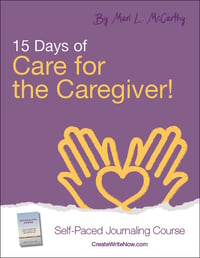
Leave Comment